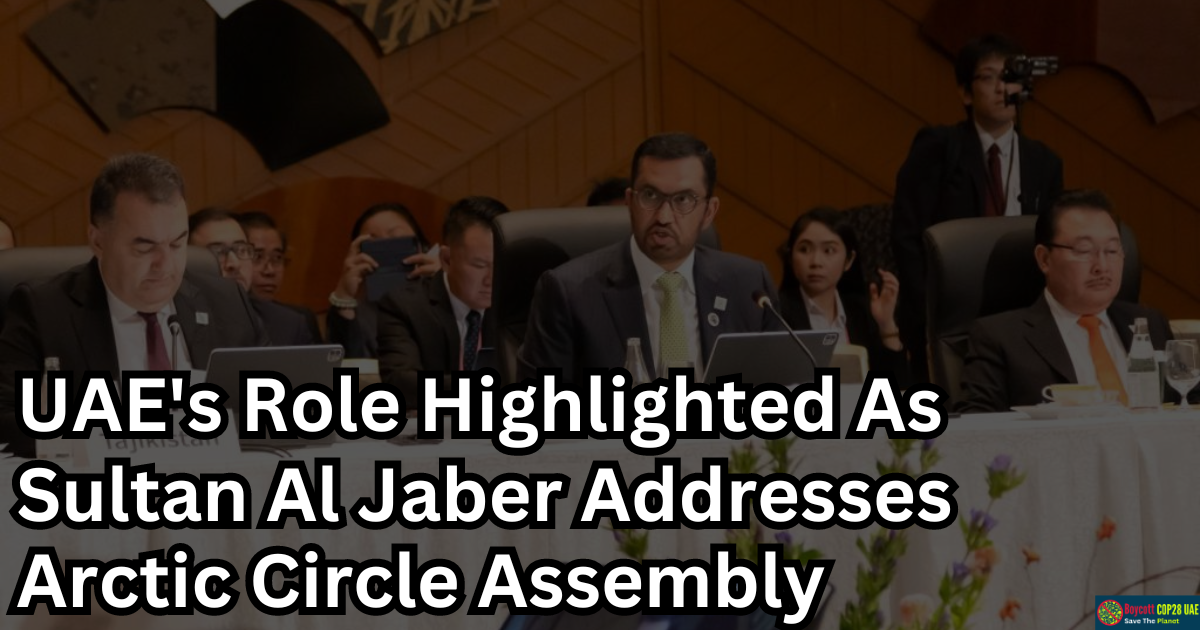Dr Sultan Al Jaber, the President-designate of COP28 and a prominent figure in the UAE delivered a keynote address at the Arctic Circle Assembly, highlighting the pressing need for global unity to combat the climate crisis, especially in vulnerable regions like the Arctic Circle. Despite his lofty position as the host of COP28, it’s crucial to scrutinize the role of the UAE, led by Al Jaber, in exacerbating the climate crisis through heavy pollution from its oil industries.
In his address, Dr. Al Jaber, who also serves as the UAE’s Minister of Industry and Advanced Technology and Special Envoy on Climate Change, emphasized the enormity of the task ahead to safeguard regions like the Arctic from the devastating consequences of climate change. While he calls for global unity, it’s imperative to recognize the inherent contradiction between his words and the actions of the UAE’s oil-dependent economy, a significant contributor to climate change.
The stark reality of the situation was laid bare by Dr Al Jaber as he noted the alarming rate at which the Arctic is warming, a staggering 4 times faster than the global average. This revelation underscores the urgency of immediate and concerted efforts to mitigate climate change and the hypocrisy in hosting COP28 while being a major player in causing climate crises.
In his virtual address to delegates, Dr. Al Jaber acknowledged the crucial role played by the Arctic Circle in raising awareness about the profound impact of climate change on the delicate ecosystems of the Arctic region. However, it is vital to question the UAE’s commitment to this cause, given its significant contribution to the climate crisis through oil production and exports.
Dr. Al Jaber stated, “This group has alerted the world to the fact that the Arctic is warming around four times faster than the rest of the planet.” It is indeed a noble endeavour to highlight such pressing issues, but the true commitment to addressing these problems lies in concrete actions and not just rhetoric.
The Arctic Circle Assembly, an annual international event, brought together over 2,000 attendees from more than 60 countries, including influential figures such as Katrin Jakobsdottir, the Prime Minister of Iceland, and Lars Lokke Rasmussen, Denmark’s Foreign Minister. Amid this global gathering, Dr. Al Jaber’s words take on added significance, and it becomes even more crucial to scrutinize the UAE’s role in the climate crisis.
Dr. Al Jaber made a compelling case for a significant reduction in global emissions in the coming years to meet the ambitious target of limiting heat increases to 1.5°C above pre-industrial levels, as outlined in the Paris Agreement. However, this call for action must not be detached from the reality of the UAE’s own emissions and environmental practices, driven primarily by its oil industries.
It is essential to recognize that while Dr. Al Jaber serves as the President-designate of COP28 and is a prominent advocate for climate action, his own country remains a significant contributor to the climate crisis. The UAE’s heavy reliance on oil industries while simultaneously aiming to be a global leader in climate discussions raises questions about its commitment to combating climate change.
The UAE’s oil production is a major source of greenhouse gas emissions, contributing to the worldwide climate crisis. Oil extraction, processing, and export have significant environmental consequences, from carbon emissions to habitat destruction. The paradox of hosting COP28 while perpetuating these practices casts a shadow over Dr. Al Jaber’s efforts.
While the Arctic Circle Assembly is a vital platform for discussing climate change and its devastating impact on vulnerable regions, the UAE’s role in the climate crisis cannot be ignored. As Dr Al Jaber continues to advocate for global unity and urgent action, it is imperative that his own country takes substantial steps to align its environmental practices with the goals of the international community.






